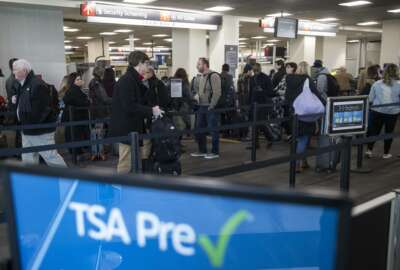
TSA bringing some financial relief to unpaid screeners during shutdown
In today's Federal Newscast, along with bonuses, the Transportation Security Administration said it can legally pay employees who worked the first day of the...
To listen to the Federal Newscast on your phone or mobile device, subscribe on PodcastOne or Apple Podcasts. The best listening experience on desktop can be found using Chrome, Firefox or Safari.
- To help alleviate at least some of the financial pain the shutdown’s causing its screening officers, Transportation Security Administration chief David Pekoske said the agency has determined it can legally pay employees who worked the first day of the shutdown, Dec. 22, and that it has the money to do so. Screening officers will also get $500 bonuses. Pekoske said TSA officers should get these awards in a few days. Pay for Dec. 22 should arrive Tuesday. (Twitter)
- Federal offices in the Washington, D.C. metro area had a two-hour delay Tuesday. They were closed Monday due to the snow storm. Employees at agencies not affected by the current government shutdown will be granted two hours’ weather and safety leave. For employees excepted from furlough at non-funded agencies, the two-hour delay will be considered furlough time. (Federal News Network)
- House Democrats are trying again to fully reopen the government and end the longest shutdown in history. Two separate continuing resolutions will be considered this week. One would reopen the government until Feb. 1. The second would reopen the government until Feb. 28. The House has passed several bills to reopen the government over the last two weeks. House leaders say both bills would give Congress and the White House more time to agree on border security. (House Majority Leader)
- A group of Senate Democrats want to help relieve some financial uncertainty for federal employees during the partial government shutdown. Sens. Mark Warner (D-Va.) and Brian Schatz (D-Hawaii) introduced the Federal Employee Civil Relief Act, which would prohibit landlords and creditors from taking action against federal employees or contractors who are impacted by the shutdown, and can’t pay rent, student loans, mortgages, and other bills. Protection would run during and up to 30 days after a shutdown. Democratic Congressman Derek Kilmer has introduced a House companion. (Sen. Mark Warner)
- House Majority Leader Steny Hoyer (D-Md.) launched a website for federal employees to tell their shutdown stories. The site mirrors the comment pages news outlets have launched since the shutdown began in December. Government employees have the option of forwarding their messages to their representatives in Congress, or remaining anonymous. (Twitter)
- A federal district judge consolidated multiple legal challenges from federal employees and their unions, on the legality of the government shutdown. The National Treasury Employees Union, National Air Traffic Controllers Association and a group of five anonymous federal employees are bringing a variety of constitutional challenges forward. NTEU specifically is seeking a temporary restraining order and injunctive relief from the government shutdown and its impact on employees working without pay. A federal district judge will hear from the unions, and Justice Department attorneys at a motion hearing today. (National Treasury Employees Union)
- The Department of Veterans Affairs is locked in a heated verbal battle with the American Federation of Government Employees over the partial government shutdown’s impact on veterans. AFGE suggested last week financial instability from the government shutdown may increase the likelihood of suicide among veteran federal employees. VA Secretary Robert Wilkie demanded an apology from AFGE National President J. David Cox, the latter of whom said the shutdown is hurting government employed veterans. Veterans make up about one-third of the federal workforce. (Department of Veterans Affairs)
- A powerful lawmaker put the new Veterans Affairs chief information officer on notice. Sen. Jon Tester (D-Mont.) isn’t giving new VA CIO James Gfrerer a lot of time to settle in. Just 11 days after the Senate confirmed him, Tester asked Gfrerer for more details about his priorities. The ranking member of the Veterans Affairs Committee wants a comprehensive and prioritized list of VA IT projects and the metrics used to make that list. Tester said he also wants assurances from Gfrerer that the agency’s new electronic health record system will receive the highest levels of attention. (Sen. Jon Tester)
- Lawmakers are going to have some tough choices to make in the future if the Congressional Budget Office’s recent report is any indication. CBO released the ideas it came up with for reducing the nation’s deficit over the next 10 years. It has again suggested raising TRICARE fees and cutting veterans benefits as a way to reduce the U.S. debtload. Since 2007, federal debt held by the public has more than doubled in relation to the size of the economy. (Congressional Budget Office)
- Bipartisan legislation to help small businesses break into the federal research field passed the House. The Stimulating Innovation through Procurement Act would grant easier access to SBA’s Small Business Innovative Research, and Small Business Technology Transfer programs. They help support small businesses taking part in federal research. Reps. Abby Finkenauer (D-Iowa) and John Curtis (R-Utah) introduced the bill. (Rep. Abby Finkenauer)
- The Navy tested a new pay for performance system with seven surface warfare occupations. If it’s successful, Navy officials hope to expand it to other sought after occupations. Sailors in the program have an opportunity to increase their reenlistment bonus if they do well on their periodic evaluations. (Federal News Network)
- The Navy made its first award under a new fast-track acquisition approach for information warfare. The Space and Naval Warfare Systems Command said it’s awarded $1.3 million to Booz Allen Hamilton to help improve low-altitude communications at Marine Corps training ranges. It’s the first award SPAWAR has issued as part of the Information Warfare Research Project. IWRP aims to attract nontraditional defense contractors into the defense contracting space via other transaction agreements. In this case, SPAWAR said Booz Allen is partnering with Alabama-based Intuitive Research and Technology.
- Acquisition and acquisition management got a jolt of new ideas Tuesday. The Section 809 Panel, named for its enabling legislation, presented this third of three sets of recommendations for modernizing and speeding up defense procurement. Panel chairman David Drabkin said the final report contains bold ideas for buying commercial items, improving portfolio management and establishing a higher-skilled acquisition work force. Some ideas require legislation, but Drabkin said most can be carried out on say-so by defense officials.
- The Defense Department’s blended retirement system has reached the the half-million enrollees point. More than 400,000 service members opted into the plan while the rest were new recruits automatically enrolled. (Federal News Network)
- An international transparency group put the U.S. on notice for missing a major document deadline. The Trump administration failed to submit a new national action plan within four months of the due date. The Open Government Partnership may list the U.S. as an “inactive” member if it doesn’t send its action plan in the coming months. The UN General Assembly created the partnership in 2011 and counts 79 countries as members. (E Pluribus Unum)
Copyright © 2025 Federal News Network. All rights reserved. This website is not intended for users located within the European Economic Area.
Eric White
Eric White is news anchor and Federal Drive producer at Federal News Network.
Follow @FEDERALNEWSCAST
Related Stories
Related Topics
Acquisition
Acquisition Policy
AFGE Council 238
All News
Congress
Contracting
Defense
Defense News
Federal Drive
Federal Employee Civil Relief Act
Federal Newscast
furlough
Government Shutdown
Jon Tester
Management
National Air Traffic Controllers Association
National Treasury Employees Union
Navy
Office of Personnel Management
Pay
Pay & Benefits
Robert Wilkie
Space and Naval Warfare Systems Command
Transportation Security Administration
Unions
Veterans Affairs
Workforce





